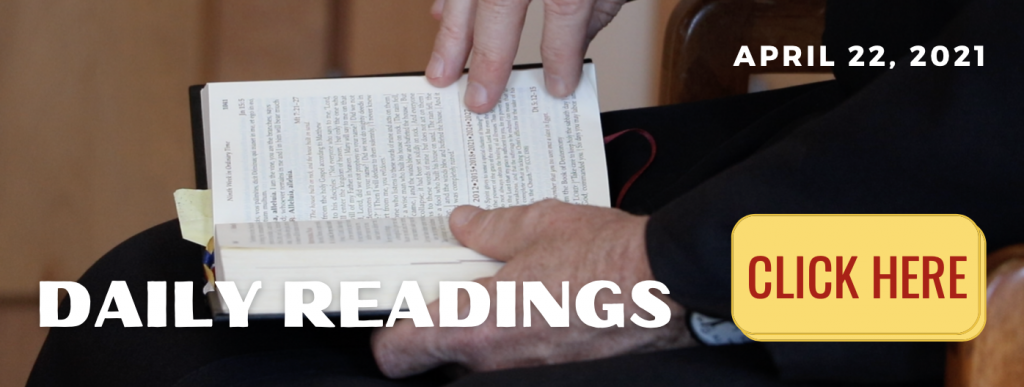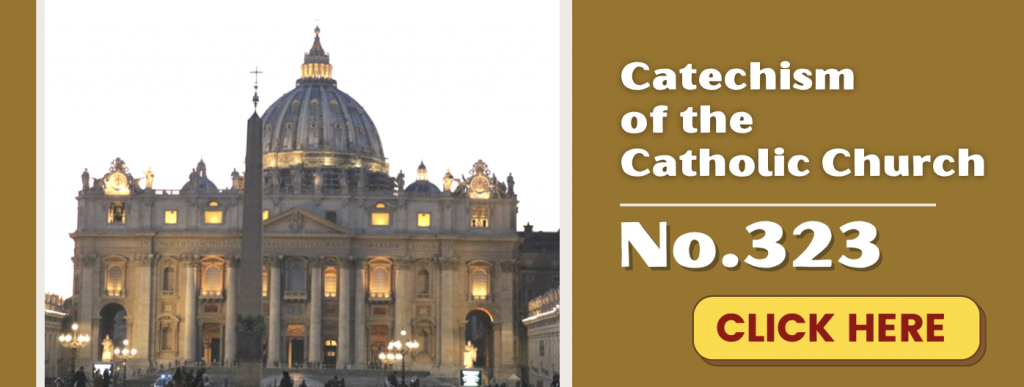


“For greater things you were born.” (Ven. Mother Luisita)
THURSDAY, April 22nd Jn. 6: 44-51 Jesus said: “I am the living bread that came down from heaven; whoever eats this bread will live forever; and the bread that I will give is my Flesh for the life of the world.”
| PART ONE… (Part Two continued tomorrow.) The Most Blessed Sacrament and the Immaculate Heart of Mary by Fr. John A. Hardon. S.J. Before I begin to explain how the Holy Eucharist and Our Lady are related, I would like to give you a brief resume of this immense subject. My plan is to cover three areas of the relationship between Mary and the Eucharist by making three statements of our Catholic faith, and then proceeding to prove each in sequence. First statement: “Without the Blessed Virgin, we would not have the Holy Eucharist.” Second statement: “Without the Eucharist, we could not now adore on earth Jesus Christ, the Son of God who became the Son of Mary.” Third statement: “From the Eucharist we obtain the grace we need to become more and more like the Immaculate Virgin Mary, and more and more loving like the loving Heart of Mary.” No Eucharist Without Mary… When the angel appeared to Mary at the Annunciation and invited her to become the Mother of the Most High, she accepted the invitation by saying, “Be it done unto me according to thy word.” At that moment, God became man. The Almighty who had been present in the world as its Maker and Sustainer, as God, began to be present on earth as man. When nine months later Jesus was born at Bethlehem, the infinite Word of God by whose power the world came into being; this omnipotent Word became flesh and began to dwell among us as a speechless Babe. During the years of His hidden life at Nazareth, God walked the streets of our earth, ate our food, drank our water and breathed our air. The Creator took on the human nature of one of His creatures and lived among human beings as a man. Why did God become man? He became man so He could have a human body and soul in which to suffer and die for our sins. He became man so He would have a human will with which He could offer Himself for our salvation by shedding His human blood on the cross. Keep in mind that the body in which Christ suffered and died is the body He received from His Mother. Except for her there would not have been the crucifixion and, we believe there would have been no redemption. And there would have been no sacrifice of the Mass. We peruse the question: Why did God become man? He became man so that as man, He could undergo the penalty that a just God demanded in expiation for the sins of the world. But is this the only reason why God became man? No! Emphatically no! God became man so He might, after His resurrection remain as man on earth, and thus fulfill the promise He had made, that, “I am with you all days even to the end of the world.” (Mt. 28:20) But we object. Did Jesus not ascend to heaven forty days after His Resurrection? Is Jesus not now in heaven, body and soul, humanity and divinity, at the right hand of His heavenly Father? Yes of course, Jesus is in heaven, as the object of the worship of the angels and saints. And on the last day, He will come to judge the living and the dead. But Jesus is also on earth. That is why right before He died, He changed the common elements of bread and wine into His own flesh and blood, and at the same Last Supper He ordained the Apostles and gave them and their successors in the priesthood the power to do what He had done. Thanks to the Priesthood, we have the Holy Eucharist. And thanks to the Eucharist, Jesus Christ is in our midst. It is the same Jesus Christ who was carried by His Mother on her visit to Elizabeth, and who sanctified the unborn John the Baptist at Mary’s words of greeting. It is the same Jesus Christ who was born at Bethlehem on Christmas morning, and was presented in the temple at Jerusalem at the age of twelve. So we could go on through the fifteen decades of the Rosary. And at each decade we could say: It is the same Jesus Christ, then and now, there and here. What do we mean by Now? We mean today, at this moment. Whatever do we mean by Here? We mean wherever we have the Blessed Sacrament. Our faith tells us, it is the same Jesus here on earth in the Eucharist who is in heaven at the right hand of His Father. It is the same identical Jesus. There is no objective difference. The only difference is on our part. In Palestine, during His visible stay on earth, the people could see only a man; yet they were expected to believe that man was God. Today in the Eucharist, we see only what looks like bread; yet we believe that behind the appearance of bread is a man, and behind the man is God. One last word on our statement: that except for Mary, there would be no Eucharist. Unless she had given Him His flesh and blood, He could not at the Last Supper have said, “This is my Body….This is my Blood.” And when He had instituted the priesthood to perpetuate the Eucharist, Jesus Christ would not be now on earth in His human nature which He received from His Mother Mary. (To be continued…) |